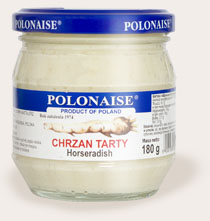



When we look for new, exotic flavours we frequently underrate Polish cuisine.
However, by tasting aromatic horseradish or well prepared pickled salted cucumbers - we go back to our childhood.
Always the same and perfect, variety of goods... our Polish flavours.
Horseradish comes from Eastern Europe and Western Asia. Nowadays it is cultivated all over the world. It was known even by ancient Egyptians. In the past it was mainly used for the medical purposes, especially in the folk medicine.
A typical medieval bandage contained mildewed bread mixed with spider web spread on a horseradish leaf - it had germicidal, antiseptic and fungicidal properties. In spite of appearances that sort of bandage worked as a natural antibiotic and fumigated the wound. Only some time later its flavour was appreciated.


Horseradish was always hallowed before Easter breakfast - it was supposed to protect a man from digestive problems during Easter feasts. Horseradish contains a lot of mineral components such as: phosphorus, sulphur, potassium, calcium, magnesium, iron, sodium and vitamins C, B, E and provitamine A. Horseradish roots and fresh leaves are used for medical purposes.
Interestingly enough, scientists claim it prevents spring weariness. That's why we shouldn't be surprised by the abundance of it on Easter tables.
Horseradish reveals fungicidal, antiseptic and a bit of diuretic properties. It stimulates the secretion of digestive juices and is recommended for people suffering from nephrolithiasis, typical indigestion, and achlorhydria. Externally it can be used as a compress relieving rheumatic pains, neuralgia or myalgia. Like other hot spices, horseradish is also said to be an aphrodisiac. Its consumption helps recuperate fast.